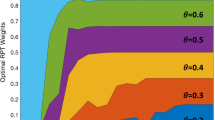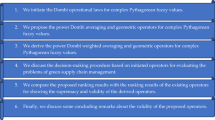Abstract
The large damages that result from construction conflicts due to delays, cost overruns and decreasing productivity justify developing new models and decision support systems for resolving conflicts in large construction projects. Since most games take place in uncertain environments, the payoffs cannot be exactly assessed in many real-world problems. In these games, the uncertainty is mainly due to the inaccuracy of information and fuzzy comprehension of situations by players. In such cases, it is reasonable to model the problems as games with fuzzy payoffs. In this paper, two methodologies are proposed for conflict resolution in construction projects using nonzero-sum games with fuzzy payoffs. The first methodology transforms the original matrix game into a family of its α-cut equivalents. The second methodology introduces fuzzy goals for payoffs in order to incorporate ambiguity of player’s judgments. In this game, each player tries to maximize the degree of attainment of his fuzzy goal. The methodologies are applied to a large oil project in the Persian Gulf. The results show that the proposed methodology can be effectively used for resolving contractual conflicts between owners and contractors in a construction project.
Similar content being viewed by others
References
Aliahmadi A, Sadjadi SJ, Jafari-Eskandari M (2011) Design a new intelligence expert decision making using game theory and fuzzy AHP to risk management in design, construction, and operation of tunnel projects (case studies: resalat tunnel). Int J Adv Manuf Technol 53(5):789–798
Barough AS, Shoubi MV, Skardi MJE (2012) Application of game theory approach in solving the construction project conflicts. Procedia Soc Behav Sci 58(12):1586–1593
Barrie DS, Paulson BC (1992) Professional construction management: including CM, design-construct and general contracting, 3rd edn. McGraw-Hill Inc, New York
Basar TB, Olsder GJ (1999) Dynamic noncooperative game theory, 2nd edn. SIAM, Philadelphia
Bazaraa MS, Shetty C (1979) Nonlinear programming: theory and algorithms. Wiley, New York
Ghodsi SH, Kerachian R, Estalaki SM, Nikoo MR, Zahmatkesh Z (2016) Developing a stochastic conflict resolution model for urban runoff quality management: application of Info-gap and bargaining theories. J Hydrol 533(1):200–212
Ho SP (2001) Real options and game theoretic valuation, financing, and tendering for investments on build-operate-transfer projects. Ph.D. thesis, Department of Civil and Environmental Engineering, University of Illinois at Urbana–Champaign, Urbana, IL
Ho SP, Liu L (2004) Analytical model for analyzing construction claims and opportunistic bidding. J Constr Eng Manage 130(1):94–104
Jafarzadegan K, Abed-Elmdoust A, Kerachian R (2013) A fuzzy variable least core game for inter-basin water resources allocation under uncertainty. Water Resour Manage 27(9):3247–3260
Kassab M, Hipel K, Hegaz T (2006) Conflict resolution in construction disputes using the graph model. J Constr Eng Manage 132(10):1043–1052
Kerachian R, Fallahnia M, Bazargan-Lari MR, Mansoori A, Sedghi H (2010) A fuzzy game theoretic approach for groundwater resources management: application of Rubinstein bargaining theory. Resour Conserv Recycl 54(10):673–682
Khanzadi M, Turskis Z, Ghodrati Amirim G, Chalekaee A (2017) A model of discrete zero-sum two-person matrix games with grey numbers to solve dispute resolution problems in construction. J Civ Eng Manage 23(6):824–835
Mahjouri N, Pourmand E (2017) A social choice-based methodology for treated wastewater reuse in urban and suburban areas. Environ Monit Assess 189(7):325
Mitropoulos P, Howell G (2001) Model for understanding, preventing, and resolving project disputes. J Constr Eng Manage 127(3):223–231
Nash J (1950) Equilibrium points in n-person games. Proc Natl Acadmy Sci 36:48–49
Nash J (1951) Non-cooperative games. Ann Math 54:286–298
Nasirzadeh F, Mazandaranizadeh H, Rouhparvar M (2016) Quantitative risk allocation in construction projects using cooperative-bargaining game theory. Int J Civ Eng 14:161
Niksokhan MH, Kerachian R, Karamouz M (2009) A game theoretic approach for trading discharge permits in rivers. Water Sci Technol 60(3):793–804
Nishizaki I, Sakawa M (2000) Equilibrium solutions in multiobjective bimatrix games with fuzzy payoffs and fuzzy goals. Fuzzy Sets Syst 111:99–116
Pena-Mora F, Wang C (1998) Computer-supported collaborative negotiation methodology. J Comput Civ Eng 12(2):64–81
Perng YH, Juan YK, Chien ST (2006) Exploring the bidding situation for economically most advantageous tender projects using a bidding game. J Constr Eng Manage 132(10):1037–1042
Sadegh M, Mahjouri M, Kerachian R (2010) Optimal inter-basin water allocation using crisp and fuzzy Shapley games. Water Resour Manage 24(10):2291–2310
Shen LY, Boa HJ, Wu YZ, Lu WS (2007) Using bargaining-game theory for negotiating concession period for BOT-type contract. J Constr Eng Manage 133(5):385–392
Zadeh LA (1965) Fuzzy sets. Inf Control 8:338–353
Zimmermann HJ (2001) Fuzzy set theory and its applications, 4th edn. Kluwer Academic Publishers, Boston
Acknowledgements
This study was partially supported by Pars Oil and Gas Company, Iran. The contribution of managers and experts of this company as well as the technical contribution of Dr. Tahmasb Mazaheri are hereby acknowledged.
Author information
Authors and Affiliations
Corresponding author
Rights and permissions
About this article
Cite this article
Sharif, M., Kerachian, R. Conflict Resolution in Construction Projects Using Nonzero-Sum Fuzzy Bimatrix Games. Iran J Sci Technol Trans Civ Eng 42, 371–379 (2018). https://doi.org/10.1007/s40996-018-0106-3
Received:
Accepted:
Published:
Issue Date:
DOI: https://doi.org/10.1007/s40996-018-0106-3










